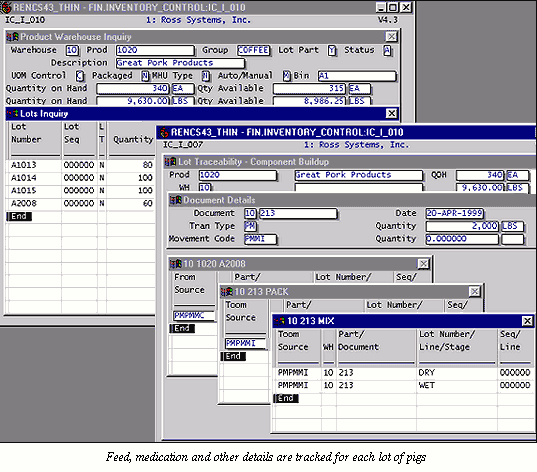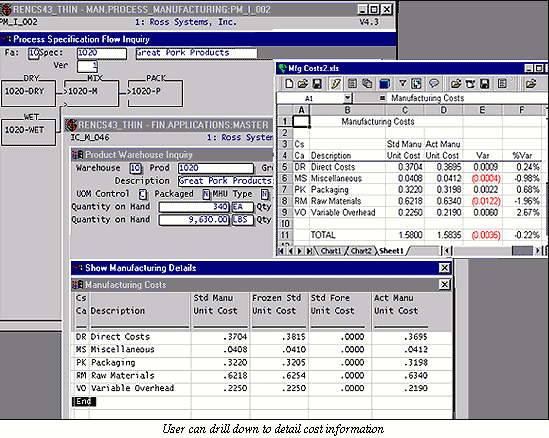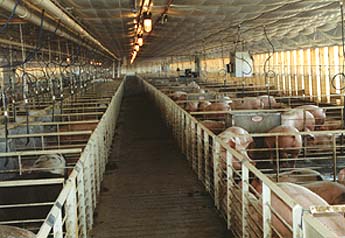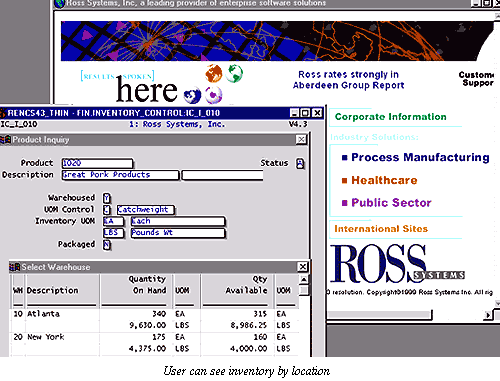Heartland Pork Implements Renaissance CS to Link Genetics, Production and Construction

Table of Contents
Fully Integrated Hog Production
Rapidly Phased Implementation - 4.5 and 2.5 Months
Renaissance CS Tightens Up the Heartland Supply Chain
Renaissance CS Positions Heartland Pork for More Growth
Renaissance CS Supports Organizational Flexibility
Renaissance CS Enables Direct Customer Linkage
Heartland Pork Enterprises is a marketplace dynamo, growing from $15 million to $175 million in sales in just four years. The ability to quickly and easily access real-time, accurate information across the company's three divisions is critical to Heartland's growth strategy and success.
"We have linked our genetic products group, commercial hog production and feed and support services, and construction division into a fully integrated supply chain," says Michael Cowan, vice president and chief financial officer. "We need complete visibility of information across that chain to control operations and to provide crucial management reports for business analysis and decision making."
Heartland turned to Renaissance CS from Ross Systems, Inc. (Atlanta, GA) for the solution. The company implemented Renaissance CS across operations at all divisions – on time and under budget – to control everything from material receipt through recipe creation and hog production.
"Renaissance CS enables us to track costs throughout our entire process," Cowan says. "The other software products we looked at were unable to do this; they could only track standard costs. None of the systems could track actual costs at the level that Renaissance CS does, and from the process-industry perspective that Ross provides."
Renaissance CS allows Heartland to set up each group of pigs as a "job" with full lot tracking capabilities. Renaissance CS then tracks each unique job as it moves through the various "production" phases, collecting detailed information at each step along the way.
"We track everything that goes into each lot of pigs," Cowan says. "The Renaissance CS recipe indicates how much feed should be used and what medication is required. We track the number of pigs produced, their weight, management and overhead costs, and so forth. Renaissance CS controls all processing transactions and data capture. We then pass that information into a data warehouse for Business Objects to report on inventory by site, production phase, source and manager; to roll up cost, revenue and profitability; and to structure other crucial performance statistics for reporting."

Heartland turns these crucial performance indicators into HTML format and posts the information to a corporate-wide intranet for onsite or remote real-time, online access by management personnel.
"Before the Renaissance CS implementation, we couldn't get our managers the information they needed, when they needed it, in the way they needed it," Cowan says. "Today we can do that. Our management can access all this information in a format that is easy to understand."

"We are providing more, better and timelier information to the entire company with the same size accounting, finance and MIS staffs," Cowan says. "Our month-end close has gone from 20 days to under 5 days. We have reduced overall costs throughout the company by a minimum of 20%, in part due to improvements in management information and controls enabled by Renaissance CS."
Fully Integrated Hog Production
Heartland Pork Enterprises Inc. is a $175 million dollar company headquartered in Alden, Iowa. Heartland employs 545 people across 16 primary facilities and is comprised of three divisions: Cotswold USA, Heartland Pork, and Quality Ag Builders. The Cotswold USA division produces genetic products for use by the company's commercial hog production company and for retail sale to other commercial pork producers. Heartland Pork produces pigs for slaughter and includes feed and management services. Quality Ag Builders builds hog confinement facilities for retail sale and for use by the other Heartland divisions.

Heartland is committed to the use of information technology to support corporate business strategy. The company identified several key aims for its new information systems solution.
"We wanted to integrate all of our information needs across divisions and locations and put an infrastructure in place to grow the business for the future, with the ability to change rapidly and meet the demands of the marketplace," Cowan says. "We felt this would help us maximize profitability on a global and local level, support the creation of a value-added food product, provide our customers with the highest-level product quality and safety, and ensure that we achieve the highest environmental standards throughout our process.'
Heartland's previous information strategy was built upon disparate systems supporting each division. Consolidation and reporting of key information was difficult and time-consuming.
"Our systems were comprised of off-the-shelf and custom-developed software working in different system environments, none of which were integrated," Cowan says. "The processes were extremely inefficient. For example, we had duplicate and triplicate entries being made in different systems; it took more than 20 business days to close our books. On top of this we did not have the detailed cost and operational informational we required. Our operations team could not get relevant, timely or accurate information to effectively manage the business, particularly on a cross-divisional basis."
Heartland formed a cross-functional selection team to look at the leading ERP software systems.
"We evaluated the candidate systems through in-depth functional and technical presentations provided by each of the software companies," Cowan says. "After a thorough review we chose Ross Systems, primarily because of its process approach to manufacturing supported by actual costing and lot tracing. As we got down to the nuts and bolts of each software product from a manufacturing perspective, it became very clear to us that Ross stood out from the crowd in terms of its manufacturing functionality and flexibility."
Rapidly Phased Implementation – 4.5 and 2.5 Months
Heartland divided the implementation into two phases. Phase one included Renaissance CS functionality for financials, distribution, and HR and payroll; the second phase focused on Renaissance CS manufacturing.
"We formed cross-functional teams to drive the implementation, with support from the Ross consulting team," Cowan says. "We are a lean and fast-growing organization and didn't feel we could dedicate a full-time team to the project. This made several things crucial to our success: empower the teams to make fast decisions, avoid customization, don't try to solve every business issue in one shot, and rely on Ross for implementation assistance."
Heartland implemented Renaissance CS quickly, going live with phase one in only 4.5 months. Phase two was completed in only 2.5 months.
"When the entire implementation was completed, the project had come in on time and under budgeted cost," Cowan says.
Ross Systems worked closely with Heartland on the rollout.
"The Ross consulting group was our primary implementation partner," Cowan says. "We partnered with Ross and utilized their consultants for different functional areas. We had a Ross project manager who worked with us to scope out the entire project. Ross also provided significant educational services. Ross played a very key and very important role in the implementation process."
The Renaissance CS focus on process manufacturing helped speed up the software installation.
"The fundamental way that Renaissance has been built – from a process perspective – not only fit in with what we were doing, but definitely made it much easier to implement the software," Cowan says. "Renaissance CS has the depth and breadth across the entire product line to meet our process manufacturing needs. The way Renaissance CS is architected makes for a very easy implementation process. We had a number of choices and decisions to make, but these were clearly laid out for us and easily understood. We feel that Renaissance CS is a relatively straightforward software package to implement."
Renaissance CS Tightens Up the Heartland Supply Chain
Heartland runs Renaissance CS on an Alpha server using the OpenVMS operating system and Oracle database. The company links 25 concurrent users at Windows 95 and 98 clients across a LAN/WAN setup enabled by TCP/IP.
Renaissance CS controls the entire operation at Heartland, from genetics through production and distribution. The process begins at Cotswold USA, where Heartland produces a genetic line of pigs.
Heartland pigs move through various stages throughout the course of their life, including nurseries and finishing facilities. They live in climate-controlled facilities and are fed specialized nutrition programs. At each stage of the process, Renaissance CS monitors genetic information, feed, vaccinations, water, climate control, inventory status and counts, and so forth.
Renaissance CS flexibility was crucial to the way Heartland operates.
"From an MRP and production planning standpoint, the other software systems we looked at could only be demand-driven," Cowan says. "One of the unique things about Renaissance CS is that not only does it have demand-driven capabilities – from sales backwards – but you can also set up a manufacturing job to be driven forward by inputs."
That's critical in Heartland's business.
"If you think about our production process, once you start producing pigs, this drives all of our material and facility needs forward," Cowan says. "The process has nothing to do with the fact that there is a demand push – once we breed a sow, it creates a whole series of activities that are going to happen downstream. We needed the flexibility to create an input-driven manufacturing process, as opposed to a demand-driven manufacturing process with conventional material requirements planning algorithms."
Heartland takes eleven months to grow a pig for sale. During that time, it must have complete visibility into "product" to meet customer commitments.
"Renaissance CS has strong customer-service capabilities," Cowan says. "For our genetics customers, we are able to see which products are in the pipeline, match them to customer orders, make sure we have what they need, then follow through to delivery and invoicing."

Renaissance CS Positions Heartland Pork for More Growth
Heartland feels that, with Renaissance CS, it now has the tool it needs to grow.
"We didn't want to put any limitations on how much we could grow because of our information system," Cowan says. "In Renaissance CS, we have installed a backbone that can grow with us. This is an information system that we will have for 20 years or even longer."
Heartland also has the information it needs to grow in a "smart" way.
"We are an entrepreneurial-focused business, very change-oriented," Cowan says. "We began as a small enterprise and made some acquisitions. During that time period we have had to make many crucial business decisions. Our people in the field have to be capable of making good decisions. Renaissance CS supports our need to keep an entrepreneurial focus to our business. Renaissance CS provides timeliness of information and accessibility of information. This has been critical for our people to make the decisions they need to make."
That's especially important in pork production.
"Our product is living and breathing," Cowan says. "If you don't have the information you need at every step along the process, you can make bad decisions that will have a huge impact on what happens to your product. The managers that run our business need the information to make good, solid decisions right now, today."
Heartland disseminates this crucial management information daily.
"We utilize a service called Safe Data, a telephone information gathering service," Cowan says. "We have sites spread out throughout the country. Our managers call into this computerized telephone system to tell us what they need and to provide us with information. We upload information from Renaissance CS every day to this telephony system. The system then downloads information back to Renaissance CS to update our feed and inventory requirements."
Renaissance CS Supports Organizational Flexibility
As a rapidly growing company, Heartland relies on Renaissance CS to help it change its organization as required.
"You can change the way you do business easily within Renaissance CS," Cowan says. "We are committed to continuous process improvement, and Renaissance CS is a big part of our ability to continually change and refine our processes. We have also used the functionality within the general ledger to improve our ability to grow as a business, in terms of being able to track cost by cost-center location, division and company. Renaissance CS enables us, as we change, to quickly reorganize to support that change. We are now able to shift and change our business as the marketplace demands."
Heartland did just that with a new plant.
"We recently completed an $11 million dollar swine feed manufacturing facility, the largest of its type in Iowa," Cowan says. "The facility produces 400,000 tons of feed a year. It's a state-of-the-art manufacturing plant and fully automated. We were able to incorporate this facility into Renaissance CS and integrate it with our operations. Renaissance CS has been critical in terms of helping us manage the facility and providing us with the tools we needed to integrate it into our organization on the ingredients, drug tracking and inventory side."
Adds Cowan, "For our construction division, we track every building project in Renaissance. We set up a project and manage all the segments, everything that happens throughout the different phases of the project, all the way through to the general ledger."
Renaissance CS Enables Direct Customer Linkage
Heartland has also linked Renaissance CS to its end customers.
"Our packers provide us with an enormous amount of data on our pigs, in terms of leanness and other quality parameters," Cowan says. "This is how we are paid – live market price plus a premium for the quality of the pig. We have automated this process with our packers. We download the information from their systems to Renaissance CS. We then analyze the information to improve how we produce and sell pigs and to guide genetic improvement."
Renaissance CS helps ensure that Heartland produces pigs to uniform quality and regulatory requirements.
"This industry is moving toward more ISO-type quality requirements," Cowan says. "With Renaissance CS lot tracing, we can capture anything that happens to a pig throughout its life cycle. We can take the pig when it's been delivered to a packer straight back all the way to the sow, all the way back through its genetics, to ensure food safety and quality. The Renaissance CS recipes outline all the things that should occur during production. This, coupled with our standard operating procedures and processes, ensures that we will be doing things on a very uniform basis. Renaissance CS also gives us the ability to review operations from a statistical basis."
Heartland has been very pleased with Ross as a company during the entire implementation process.
"Ross Systems played a key part in our successful implementation," Cowan says. "We have been very, very happy with the depth, functionality, support and usability of the product."
For more information contact Ross Systems, Inc., Two Concourse Parkway, Suite 800, Atlanta, GA 30328. Tel: 770-351-9600.
